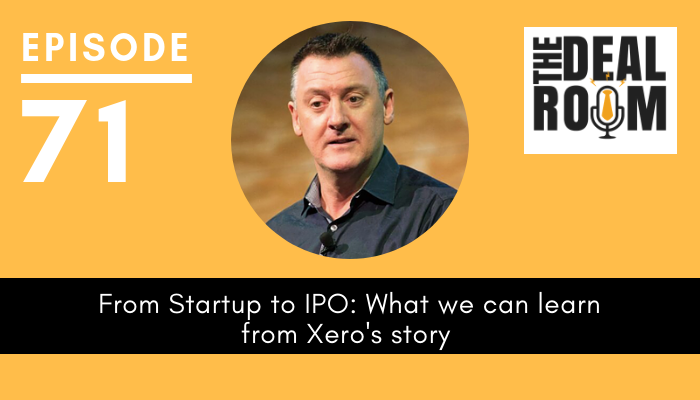
Today we get an inside take on Xero’s journey as a publicly listed tech startup from its former country manager, Wayne Schmidt. In this episode, we’ll examine the listing process and how an IPO strategy worked for Xero. Then we’ll also look closely at the background of the two founders Rod Drury and Hamish Edwards.

Episode Highlights:
- Digital nomad, philanthropist on a one way ticket around the world
- Starting with a clear strategy to list
- Transitioning from MYOB to Xero
- Launching a disruptor in the accounting space
- The background of the two founders
- Xero’s growth and listing on the ASX
- Knowing when to get out
Joanna: Hi it’s Joanna Oakey here and welcome back to The Deal Room podcast, a podcast proudly brought to you by our commercial legal practice Aspect Legal.
Today we get an inside take on Xero’s journey as a publicly listed tech startup from its former country manager, Wayne Schmidt. In this episode, we examine the listing process and how an IPO strategy worked for Xero which if you haven’t heard of it, is now a very widely used accounting software. After we examine the listing process, we’ll also look closely at the background of the two founders Rod Drury and Hamish Edwards.
If you’re a tech startup interested in listing or an advisor to tech startups who want to IPO, keep listening and we’ll get started!
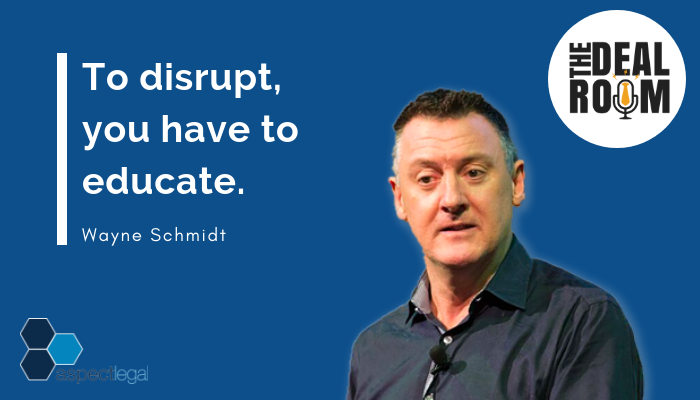
Digital nomad, philanthropist on a one way ticket around the world
Joanna: Wayne, can I just say firstly a massive thank you for coming in today onto our show. I know this is going to be a big blast. Let’s just kick it off. You are talking to us from Koh Samui (Thailand) right?
Wayne: Yes, and I put a nice shirt on just for you. I’m currently travelling on a one way ticket around the world and I only have one shirt. I am actually in shorts to be honest.
Joanna: Many of our listeners will just be getting the audio of this. So I tell you what. We might even release some of the video of this, because that was quite funny Wayne. That was hilarious!
So you’re sitting there in Koh Samui because you’re living the dream. You’re on a one way ticket at the moment and seeing the world. Is that right?
Wayne: Yes. One way ticket. I’m calling myself a digital nomad now.
Joanna: Digital nomad! Okay. I like it. I like the term. What the hell does that even mean?
Wayne: We’ve set out our business so that we can work anywhere, so we can work remotely and still travel. Fundamentally, after we launched Xero, we were sitting down and figuring out what we want to do in our life. We wrote down all our passions and to travel was one of them, philanthropy is a huge one for us and still wanting to work and give back, but in our own time. So we wanted to control our own destiny, and controlling our destiny meant we had to really restructure our lives. We sold up everything in Australia and then just get a leap of faith. Australians are pretty good at saying gonna. Gonna do this. Gonna to do that.
Joanna: They are! A hundred percent! So you put action behind it, Wayne. You put action behind it.
Wayne: Yeah. I’m very much an executional type guy. I’m best at a startup in the first two years. After that, I tend to spend most of my time in the HR Department.
Joanna: Let’s not drill there further. So let’s go back then a few years, Wayne. I guess the story that we want to talk about today is Xero as a whole. So how the business grew to a successful exit, how that exit felt and how it worked. But let’s just go all the way back because I think in some of our discussions in the past, you said that the plan for (and I guess IPO is not an exit) but the plan for the outcome of Xero was formed right at the beginning. So Xero was formed on the basis of how the business saw itself at the end.
Starting with a clear strategy to list
Wayne: It had a very clear strategy. So Xero is a New Zealand company. It was formed in 2006 by Rod Drury and Hamish Edwards, so two co-founders – an entrepreneur, Rod Drury, and an accountant, Hamish Edwards.
They formed Xero with a strategy that they were always going to list because they realised that you’re going to need capital to get a software development as big as this. Writing accounting product isn’t cheap. They wanted to go wide. They wanted to go multinational from day one. So they went straight with an IPO listing very early on. Like within the first year they had IPO.
Joanna: Wow.
Wayne: On the New Zealand stock exchange, within a year and get that funding. And they did the bare minimum, what we call a minimal viable product (MVP) which basically means it doesn’t work.
Joanna: And what year was this Wayne?
Wayne: 2006 is when it’s formed, got listed 2007 on the New Zealand stock exchange.
And I was working for the direct competitor. I was working for MYOB. At that stage I was the country manager for MYOB over in the UK.
At MYOB, quarterly we’re making sure all the Country Manager or Managing Directors would come together from each region and we’d look at Xero and go “Oh, they’ve got a thousand customers. It’s from New Zealand. It’s cloud. The cloud’s never going to take off.” No no no. It’s nothing. It’s just Wayne, would you just shut up and I got the Wayne, would you just shut up often.
And eventually one day, I was sitting there going “I really think this product can go places.” If you remember in those days, especially in Australia, MYOB is the market leader. It’s just huge.
Joanna: Yeah.
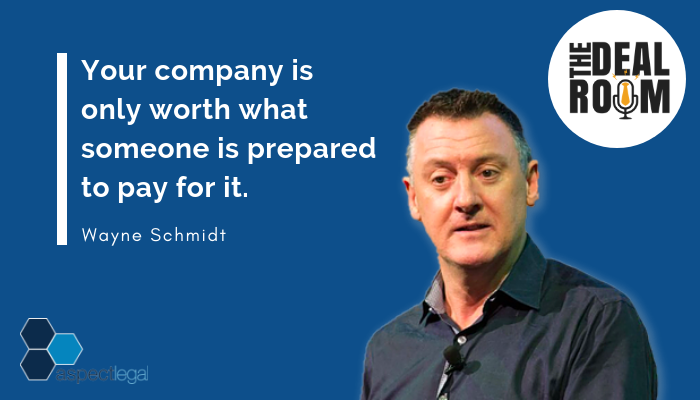
Transitioning from MYOB to Xero
Wayne: And I can remember it was a Friday afternoon. I still remember it quite vividly. Xero wasn’t in Australia. They were in New Zealand. Their share price had been a dollar for a couple of years. It’s on those early years, those real struggle years. It was gradually, slowly getting clients in New Zealand. And Friday afternoon, I sent an e-mail to their CEO Rod Drury saying “Hey, we should catch up and have coffee.”
Big alert for all the people here if you’re staff is saying they’re going out to have coffee, they’re going to look for a job. Okay?
Joanna: Okay. I’m writing this down. This is actually good intel. Thanks Wayne.
Wayne: I’m pretty sure staff saying I’m out to have coffee today. Right. They’re looking for a job. And that’s what happened. I can still remember. I sent an email to Rod, met Rod on LinkedIn and that’s how I was introduced to him, through technology.
Over the process of about three or four months, a very very long interview process and selection process to get through. I was interviewed by everybody including the janitor I think by the end of it.
And one thing led to another, I ended up getting the job. So being the Country Manager. So we launched Xero in Australia on the first of October 2009 and we’re a startup. We launched it on our kitchen table.
Joanna: Wow, that is incredible! And I’ll tell you what. I remember, I was starting my practice at around about my legal practice around about that time. And I’d always come from using MYOB in the background. But I wanted to start this legal practice a little bit more innovative than practices that I’d been in in the past and so I was onto Xero at the end of 2009. So I must have been some of your first starters here in Australia.
But I just remember at the time just thinking this is awesome from a business perspective. How much easier it is from the user experience as a business, as a business owner to integrate with the software without you know I started the business as a really small entity so I didn’t have a lot in terms of staffing so I wanted stuff that was practical and I guess Xero is just that perfect example of that type of I guess disruptor. Whilst it’s not disruptor in the Uber sense, certainly it was a different way of doing accounting, bookkeeping software right?
Launching a disruptor in the accounting space
Wayne: I would actually say we were disruptive and I’ll challenge you on that Joanna. Because you’re launching a software company against the entrenched player, MYOB is a household brand name. I worked there you know. I headed up Marketing at one stage and I had a marketing budget where I could just go and stick some brand on the back of a bus and they think I was good.
We had a couple of things that we decided. First of all, we were always going to lead from the front. So we were not going to mention the competitor. So we never mentioned our competitors names and we always led from the front.
But we were disrupting and so when we’re disrupting, you’re going to have to educate. One of the things I learnt very early on is to disrupt, you have to educate. So we spent a lot of the time, like I remember employee number two is my wife in the company.
I still remember how she got hired. Rod was over from New Zealand. We’re at our local Greek restaurant, my wife (Sally) and I and Rod Drury, the co-founder and CEO. Sally went to the bathroom and Rod said “We should hire her.” And I went “Okay. It would be good if you gave me the budget.”
And that was possibly one of the things that made Xero what it was in those early days because she’s a Sales Operational person. So having a Sales Ops person and a Sales Marketing person was such a plan.
One of things to disrupt was she just got me in a car and I did a massive road trip around the eastern seaboard Australia. I would be visiting two cities a day, doing events like this to be in front of maybe six people. I’d danced if it ever got to 10. It was hard because I had a marketing budget and nothing so we have to figure out what we could do which was events and the other thing is social media.
I learned everything I know about social media through Xero and specifically Catherine Walker. Big shout out to Orange Girl. She taught me everything about. Orange girl’s her tag. Anybody from Xero would know. She manages their social media and they lead with social media because we realized the leverage effect. It was a one too many.
I only got onto Twitter like a month before I went to start working at Xero and now I talk about social media all time, around the world and how you can leverage it for any business.
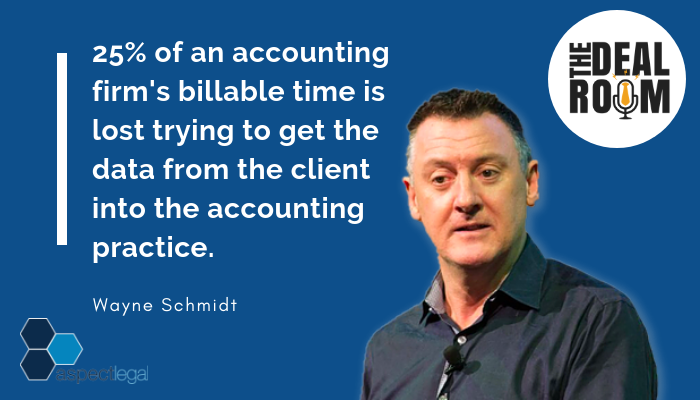
The background of the two founders
Joanna: What was the background of the two founders before they started Xero in New Zealand. Do you know?
Wayne: Oh yes. Well Rod Drury was very successful entrepreneur. He’d set up a company called Aftermail prior to Xero, which was some type of backup facility from mail, something like that. I really don’t know to be honest. But he made some. I’ll look, you know.
Joanna: Whatever, something in the tech space!
Wayne: It gave him some funding. It gave him some skill set for setting up a company, selling company. Your company is only worth what someone is prepared to pay for it. So get over it.
Joanna: Exactly.
Wayne: Here’s a classic example. Wayne got greedy once. Had an offer to sell one of my previous companies. I said no it’s worth more than that and then I got nothing, like absolutely nothing. That was silly. So you know you company’s only worth what somebody is paid to pay for it right now when they’re going to give you a check.
But he’d sold a company so he learnt. He’d really learnt setting up, selling it and having an exit strategy. And Hamish, as an accountant, was sick of what I called dirty datafile so you have to go back, say take the wayback machine. Go back into the 2000s.
Imagine if you’re an accountant in 2005. The way your client sent their data to you was on a CD ROM. Well, normally CD ROM or they might e-mail you their data. Here is my data for the year.
But the problem is it might be on an old version and your on the latest version. If you upgraded, you can’t send it back to them. You might start working on it and then the client says sorry that was the wrong year or that was the wrong data. Or the client goes and works on it while you’re still working on it. So you could see the massive inefficiency and I call them dirty data files.
There was a really good study. I think it was done by, I might not be quoting this correctly, so I think it was done by Deloitte that 25 percent of an accounting firm’s billable time (now that will get everybody interested) was lost trying to get the data from the client into the accounting practice. So 25 percent of your billable time.
Joanna: So this was really about identifying a real issue and then going out and saying well that there is nothing out there like let’s just design it ourselves. That’s amazing.
Wayne: That was one of the big things. People think oh well what they did was they got a desktop product and moved it to the cloud. Well that’s not disrupting.
Joanna: Yeah.
Wayne: All you did was get something that used to work really really quickly and put it onto a cloud platform that potentially would run slower.
Joanna: Yeah.
Wayne: What was disruptive was saying okay what was the problem. The problem was an accounting firm. I mean you’ve got to think about the numbers the average accounting firm per partner has say 200 clients. They might have a three partner firm, that would be 600 data files who might have multiple entries. So they’re probably dealing with a thousand data files per practice, a thousand different versions.
Joanna: Wow.
Wayne: Can you imagine the pain? The absolute pain that they’re in. So you’ll hear this term called the single ledger e.g. I just want one version of the data. I just want to be able to log in and look at your data. I don’t want you to have to send it to me. I don’t want to have to send it back to you. So that was the problem that Hamish came up with.
So Hamish was the accountant saying I don’t want to deal with a thousand data files and Rod was the technology person saying well why don’t we do accounting in the cloud. But he was getting accounting in the cloud but when you get those two, the technology version and the practical accountant and you fuse them together, you get something quite beautiful.
Joanna: Yeah, that’s amazing. And I thought in your relaying that story, there’s a couple of things that really jumped out at me and one was you talking about Rod’s experience in his previous business setting him up for this.
I had this interesting discussion in a previous podcast on The Deal Room, which we’ll link through too in these notes, where we were talking about the importance of exits to innovation in businesses as a whole. Because the whole process of businesses, entrepreneurs starting up their first business or their second business and then exiting it in some form, whether successful or not successful.
But the things I learn from that, taking that into the next business and then if they exit that, the next again and building and building and building until they get really good at really identifying what’s truly innovative and what will really take off. I’m thinking of that discussion when I’m hearing you talk about Rod here and even your own experience here when you said your involvement in a previous company where you’d left it too long before you sold your shares.
Obviously, that really helped drive your behaviour with your Xero shares, where you took your shares off the table but watched others around you who obviously didn’t have that experience. I guess it just goes to show that there’s a really big importance of. We’ve talked about you individually, the importance of being able to change positions over time. But also from an entrepreneurial perspective, really maybe there’s a lot to be said for doing this process really re-working out where is the right place for you and not holding on to things for too long.
Wayne: There’s a classic here. Xero was co-founded by two people, and you can notice Hamish Edwards exited the company very early on. So probably two years after I started maybe, maybe a year. They’d been there for the first four years. He’s now, I love his LinkedIn title. I think it says Gentleman.
And I loved that because he is an accountant. He was heading up sales and he’s an accountant. It wasn’t his position. It wasn’t his passion.
And it’s like Rod. He’s moved on. He’s more into not the CEO. So he’s not in the strategic view. He’s more in the innovation. I’m looking at the future of the product and still thinking about that. So everybody has a journey.
I think it’s terrible when you see people just clinging on to that role that they’ve had all the time thinking I’ll just grow as the role grows and you now got 2000 people underneath me and that’s what I’m supposed to do. No no. You can change and there’s nothing wrong with accepting that things will change. Like you’ll do side steps like I’ve done now. Like I’m on a side step now, so what I’m doing now is so different to what my. I’ve got a degree in flight science mathematics programming. I’m supposed to be a programmer. Go figure!
Joanna: I so don’t pick that. That’s crazy Wayne.
Wayne: I couldn’t even add up to save myself. Some of the things I love about my university as when I’m cutting code is I still know when programmers are concealing stuff because I might not cut code these days but you just know because I can smell it. I can sense it and they know that I can cut code enough to know when potentially you might be lying to me. Because I’ll say to someone “Yeah, I think you’re lying to me now.”
I wrote a chapter in this book called Better Business Better World, which is part of the Business For Good group that I’m part of, which was always fundamentally look at your life at this particular point in time. Like I’m 56 now, on a different stage so don’t try. Okay, don’t compete against. Like I have some of my friends that are in their 30s going I wish I had your life. But your 30. You’re not going to have my life. You’re just 30. Get over it.
When I was 30, I was sitting there working my guts out. I didn’t forget the early days of Xero. We didn’t have a cleaner. It was Sally and I. We cleaned the toilets in the company. People forget about those early days. We did it every Friday. I got toilet duty. Sally got the bathroom duty. We did that for the first year because we had no money to afford a cleaner so we would do the cleaning. And we did it because we didn’t want the team to do it.
So don’t compare yourself to other people in different age brackets, different socio-economics. All you do is compare yourself about am I achieving what I should be achieving based on my skill set and my passions and what I’ve gotten and what tools I’ve got right now.
Xero’s growth and listing on the ASX
Joanna: There’s a number of things that I’d like to talk about about where you are right now. But before we do that I just want to go back and talk about Xero’s progress of listing in Australia.
And maybe you can walk us through what happened and then let’s investigate those areas. Because I think this will be quite interesting to our listeners who are thinking about listing and some of the process and the realities of what it involves.
Just before we get into that. I talk to a lot of businesses who have this concept of listing at the back of their mind, because it’s this pot of gold. Right? It’s the business rainbow. But I just think it’s really interesting to have these discussions when they’re really grounded in reality. Well let’s look at how it really happens.
So anyway, tell us about that history. We know that it was listed in New Zealand, brought Xero to Australia and then what happened up to the listing in Australia and walk us through it all.
Wayne: Xero was always going to at least do a dual listing. And one of the things is setting in New Zealand was, and that gave them the initial capital injection they needed to fund the development, fund the growth of the company in New Zealand and you then needed to go and expand more and the New Zealand market space is limited for that fundraising.
Obviously, coming across to Australia was great. By that stage Xero’s now starting to grow quite well. Market share wise we had good numbers. It was a good story to tell. Then all the growth numbers. Everything that we were doing was a good story to tell both potential investors, the media. We had our poster child, Chris Reed. He’s got a great media presence and that’s really important too.
This is one of the things I keep talking about skill sets. I don’t like that. You could not put me on a TV. There’s not enough money in the world. So I don’t want to do that.
So you’ve got to have the right front person, and Chris was the person for that. He’s really good at doing all the media interviews.
So the listing went really well. They’ve already done the regular groundwork in New Zealand so this was kind of basically a repeat of the same process. Gained a good press and started winning awards, software awards, leadership awards. The leadership team, so Chris Reed, I think he was CEO of the year and awards like that. We were winning software awards.
So this is you’re building up. So you’re not just saying we’re going to launch on this day. Well you’ve got to have done a whole range of steps, not just have got proven market, have got enough sales, got the team right, getting the branding.
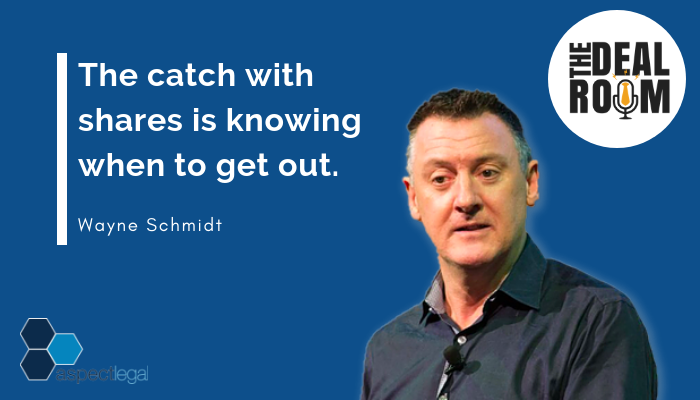
Knowing when to get out
Wayne: Now here’s the classic thing, is knowing when to get out, specially for employees. Employees can get, traditionally in software vendors, not speaking out of school. Traditionally, anybody in the first hundred staff of a software vendor will become quite successful, independently wealthy just by working for that software vendor.
Normally the first 100, because the share packages just work that way. You have to look at Microsoft. You have look at all the original companies. The first hundred are the ones that normally do. I always call it the leap of faith.
I want to thank all those accounting firms out out there who came to the first session. You went there with no one else went there and so that’s the same employees I tend to that first hundred who take massive pay cuts. I remember hiring salespeople and they were all over 100,000 dollar salaries and I was offering them 40,000.
Joanna: Wow.
Wayne: You know like massive pay cuts and I call the leap of faith. So they deserve to be remunerated in shares. That’s all you got.
But however, the catch with shares is knowing when to get out. And I watched the Xero share price. We had a point that we said, “how much is enough?” Write down what is your number. Write it down, and go once it gets to this. Yeah, it might go more. But I’ll take something off the table. So once we got to 30 dollars, we took some money off the table. And then when you got to 35, we took more. Then it hit 40, we took as much as we could. And then the Xero share price tanked and went down to I think 18 dollars.
Joanna: That’s some really big movements there, because you talked about starting at a dollar. So we went from a dollar to 40 and down to 18.
Wayne: And now I think it’s back up around 40 mark. But when it went down, I think it got down to 12 at one stage and it stayed at 12 for a year or so.
So my advice to employees, take some money off the table when you can. If something goes wrong, don’t be greedy. How much is enough? Take something back. You don’t have to sell all your shares. But take something off the table because you never know with shares.
Shares are so volatile that you wake up one morning and you’ve got a new president elected and all of a sudden everything just tanks and it’s beyond your control. And that happens! And things happen. That’s why I strongly recommend take something off the table. At least take your original investment off and then no matter what you can’t go backwards. At least you got your money back. But people get greedy.
I noticed that some people wanted fifty dollars. They weren’t going to sell until it got to 50. But then it went down to 12. So yeah, we took some money out and that was that. That’s my piece of advice.
Joanna: And so tell me what else was happening in the general business. Xero delisted in in New Zealand. Was that right?
Wayne: Yeah.
Joanna: And why was that? What led to that?
Wayne: I can’t say at this stage because that was half my time so I don’t know. I assume it was because it made more sense to be only in the regulatory requirements would have been it would have been just makes economic sense to be listed only in Australia and that’s probably a stepping stone for a long term listing. But again this is all hearsay.
Joanna: That concludes this episode with Wayne Schmidt, Xero’s former Country Manager to Australia when it first launched in 2009. As a quick recap, today we examined the listing process through Xero’s own journey to becoming a publicly listed tech startup. We also looked closely at the background of the two founders and the drivers that pushed them to start Xero.
I hope you enjoyed what you heard today. If you’d like to hear more about how Xero differentiated itself to become a billion-dollar market leader, check out our sister podcast Talking Law and look for episode 73 or visit our show notes for this episode and we will link right through to that episode.
Well, that’s it for today. If you aren’t already subscribed to The Deal Room, please head over to Apple Podcasts or your other favorite podcast player and hit the Subscribe button to get notifications straight to your phone when our next episode is out.
Thanks again for listening in! This has been Joanna Oakey and The Deal Room podcast, a podcast proudly brought to you by our commercial legal practice Aspect Legal. See you next time!
Our Business Sales and Acquisitions Services
Aspect Legal has a number of great services that help businesses prepare for a sale or acquisition to help them prepare in advance and to get transaction ready. And we’ve also got a range of services to help guide businesses through the sale and acquisitions process.
We work with clients both big and small and have different types of services depending on size and complexity. We provide a free consultation to discuss your proposed sale or acquisition – so see our show notes on how to book a time to speak with us, or head over to our website at Aspectlegal.com.au
Disclaimer: The material contained on this website is provided for general information purposes only and does not constitute legal advice. You should not depend upon any information appearing on this website without seeking legal advice. We do not guarantee that the contents of this website will be accurate, complete or up-to-date. Liability limited by a scheme approved under Professional Standards Legislation














